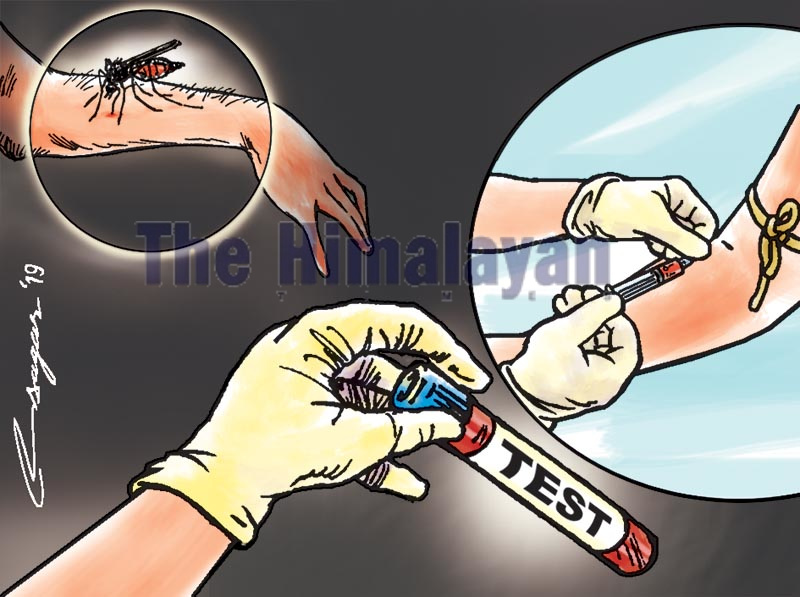Dengue cases on the rise, country lacks testing kits
Kathmandu, May 27
With the increasing number of coronavirus cases in the country, the risk for dengue and other mosquito-borne illnesses has increased.
Continuous rainfall, rising temperature and humidity has provided a perfect environment for mosquitoes to breed.
According to Epidemiology and Disease Control Division, under the Department of Health Services, a total of 65 cases of dengue have been reported in 23 districts across the country since January this year.
Rupandehi has reported 14 cases while Kathmandu valley has reported ten cases – six from Kathmandu and four from Lalitpur — of the mosquito-borne illness. Meanwhile, nine cases each have been reported from Myagdi and Kaski and three cases each have been reported in Kapilvastu and Morang.
Similarly, two cases of dengue have been reported in Sunsari and one case each has been reported in Dadeldhura, Ramechhap and Terathum districts.
Though the cases are on the rise, it has been reported that there is a scarcity of kits for testing dengue across the country.
“The EDCD doesn’t have kits to test the mosquito-borne illness.
Scarcity of test kits is sure to affect surveillance of dengue. We need to use the kits to find cases in the community,” said Dr Prakash Shah, chief at Vector-Borne Disease Control Section at EDCD.
According to the EDCD, 14,662 people tested positive for dengue and six people lost their lives between July 17 and November 4 in 2019. The disease had spread in 67 districts across the country. To trace the number of cases, we need the testing kits.
“We have requested for 10,000 kits from World Health Organisation,” said Dr Shah.
Testing samples using polymerase chain reaction method will help find out the dengue serotype.
“We can test the dengue type with the help of polymerase chain reaction method. But we don’t have chemicals and reagent to test dengue,” said a health official on the condition of anonymity.
“If the procurement process of PCR testing kits begins now, it will take at least a month to arrive in Nepal. But the procurement process has not yet started,” said the official.
“In case, if there is an outbreak like last year, we will not be able to know the serotype of dengue,” the official said.
“Guidelines for the prevention of dengue have been provided to the local levels across the country.
Both COVID-19 and dengue tests should be done if people suffer from fever,” said Uttam Raj Pyakurel, vector-borne disease inspector at EDCD.
To prevent dengue, people must clean their surroundings; wear full-sleeved clothes and use mosquito repellents and nets.
A version of this article appears in e-paper on May 28, 2020, of The Himalayan Times.






